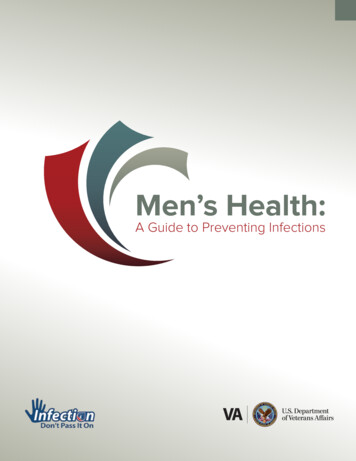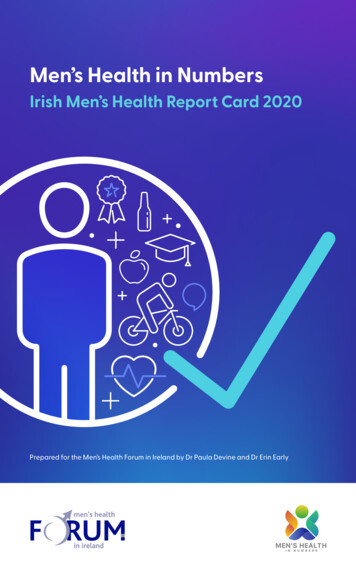
Transcription
Men’s Health:A Guide to Preventing Infections
Men’s Health:A Guide to Preventing InfectionsInfection: Don’t Pass It On (IDPIO)Infection: Don’t Pass It On CampaignVHA National Center for Health Promotion and Disease PreventionVeterans Health AdministrationCampaign Contributing TeamNational Center for Health Promotion andDisease Prevention (lead office)Occupational Health ServicesPatient Care ServicesWomen Veterans Health ServicesEmployee Education SystemNational Infectious Diseases ServiceOffice of Nursing ServicesVA National Center for Patient SafetyFacility Health Care Professionals
Men’s Health: A Guide to Preventing InfectionsIntroductionWe all want to stay healthy. And, we all want our friends and loved ones to be healthy too. Preventing infection is agood start. The first step is knowing how infections are spread. The second is learning how to prevent infection.The VHA National Center for Health Promotion and Disease Prevention along with the Infection: Don’t Pass ItOn Campaign are pleased to provide Men’s Health: A Guide to Preventing Infections. This guide provides anoverview of infections ranging from the common cold to sexually transmitted infections. This information has beencustomized to address the health concerns and issues specific to men. I hope you will use this guide to learn howto reduce your risk of getting sick, which will also help stop the spread of illness to those around you.Veterans Health Administrationi
Men’s Health: A Guide to Preventing InfectionsEach section has information on: How the infection is spread. What the signs of infection are. How the infection is treated. How to avoid infection. What you should do if you are infected. Links to more online information.Jane Kim, MD, MPHChief Consultant for Preventive MedicineIf you have specific concerns or think you have aninfection, talk with your health care provider. He orshe will be able to advise you on tests and treatmentsand develop a plan to keep you healthy and free frominfection.VA National Center for Health Promotionand Disease PreventionRemember that we all play a role in stopping thespread of infection. I hope this guide is a usefulresource on infections and how you can take stepsto prevent On
Men’s Health: A Guide to Preventing InfectionsAcknowledgementsThis book would not be possible without the commitment and determination of the Infection: Don’t Pass It On(IDPIO) campaign members. Special acknowledgement goes to Jim Schneider, Mick Gillis, and Jonna Brenton.From concept, they have worked months to collect and assemble the content and organize it into this guide –while maintaining care and services to Veterans.Veterans Health Administrationiii
Men’s Health: A Guide to Preventing InfectionsMy sincere thanks goes to other members of IDPIO whose edits have diversified and strengthened theeducational value of the guide. Special recognition goes to these and other colleagues within the Veterans HealthAdministration who made contributions, small and large alike, and supported development of this guide and madeit a reality. L orraine Bem, EdD, MSHA, MSN, FACHE; National Project Manager/ANCC Nurse Planner, Birmingham EmployeeEducation Resource Center J onna Brenton, RN, MN, CNL; Women Veteran Program Manager, VA Montana Health Care System M aggie Chartier, PysD, MPH; Deputy Director; HIV, Hepatitis and Related Conditions; Office of Specialty CareServices, VA Central Office M arla Clifton, RN, MSN, CIC; Clinical Programs Coordinator, National Infectious Diseases Service, VACentral Office K athleen De Roos, APRN, MSN, CIC; Clinical Programs Coordinator, Healthcare Associated Infections (HAI),National Infectious Diseases Service, VA Central Office C ynthia L Gibert, MD, MSc, Professor of Medicine, George Washington University Medical Center, Director ofSpecial Projects Medical Service, Washington DC VA Medical Center M ary “Micki” Gillis, RN, MSN, CIC; Infection Control Coordinator, Boise VA Medical Center J ohn Goldizen, MSN, RN, CCRN; VHA-CM, Deputy Associate Director, Nursing and Patient Care Services,Charleston VA Medical Center P amela Hirsch, NP-C, BS, MEd, MS; Director of Employee Occupational Health, Occupational Health Services;VA Central Office J ane Kim, MD; Chief Consultant for Preventive Medicine; VHA National Center for Health Promotion and DiseasePrevention; VA Central Office S tephen M. Kralovic, MD, MPH, Hospital Epidemiologist, Cincinnati VA Medical Center and MedicalEpidemiologist, National Infectious Diseases Service, VA Central Office D arren R. Linkin, MD, MSCE; Hospital Epidemiologist, Philadelphia VA Medical Center, Assistant Professor,University of Pennsylvania (lead clinical advisor) V icki Macks, RN, BSN, CIC; MDRO Prevention Coordinator, Memphis VA Medical Center S cott E. Mambourg, PharmD, BCPS, AAHIVP; Associate Chief, Clinical Pharmacy and Education Programs, SierraNevada Health Care System orenzo McFarland, DHA, MPH, MSW, PMP; Senior Program Manager; HIV, Hepatitis and Related Conditions;LOffice of Specialty Care Services D ore Mobley, Communications Specialist, Patient Care Services; VA Central Office K ristin L. Nichol, MD, MPH, MBA, Chief of Medicine and Director; Primary and Subspecialty Medicine ServiceLine, Minneapolis VA Healthcare tOn
Men’s Health: A Guide to Preventing Infections J acqueline Parker, RN, MS, MPH; Patient Safety Officer, VISN3–NY/NJ HCS E li Perencevich, MD, MS, Director, Center for Comprehensive Access and Delivery Research & Evaluation(CADRE), VA Iowa City Health Care System K athleen Pittman, RN, MPH; National Program Manager for HPDP Programs; VHA National Center for HealthPromotion and Disease Prevention; VA Central Office S herri Pruett, RN, BSN; Occupational Health Services, Salisbury VA Medical Center H eather Reisinger, Ph.D., Associate Director for Research, Center for Comprehensive Access and DeliveryResearch & Evaluation (CADRE), VA Iowa City Health Care System A my Sanchez, MD; Preventive Medicine Resident; VHA National Center for Health Promotion and DiseasePrevention; VA Central Office A lex (Jim) Schneider, PharmD; Pharmacoeconomist, VA Nebraska Western Iowa HCS J ay Shiffler, Communication Specialist; VHA National Center for Health Promotion and Disease Prevention; VACentral Office C ynthia Wilson, RN; Cardiac Cath/Electrophysiology Lab Manager, Palo Alto VA Medical CenterTroy Knighton, LPC, EdS, MEdNational Seasonal Flu & IDPIO Program ManagerVHA National Center for Health Promotion & Disease Prevention (NCP)VA Central Office810 Vermont Ave, NW Washington, DC 20240Infection: Don’t Pass It OnI nfection: Don’t Pass It On (IDPIO) is an ongoing public health campaign to involve VA staff, Veterans,their families and visitors in preventing the transmission of infection. The campaign develops anddistributes education and communication materials for the VA community that promote: Hand hygiene and respiratory etiquette. Annual seasonal influenza vaccination. Correct and appropriate use of personal protective equipment. Pandemic influenza preparedness and response. Basic public health measures to prevent transmission of infection.Veterans Health Administrationv
Men’s Health: A Guide to Preventing InfectionsContentsSexually Transmitted Diseases (STDs). . . . . . . . .3Epididymitis . . . . . . . . . . . . . . . . . . . . . . 63l Chlamydia . . . . . . . . . . . . . . . . . . . . . . 7Shingles . . . . . . . . . . . . . . . . . . . . . . . . 67l Genital Herpes. . . . . . . . . . . . . . . . . . . 11Safer Sex. . . . . . . . . . . . . . . . . . . . . . . . 71l Genital Warts. . . . . . . . . . . . . . . . . . . . 15Colds . . . . . . . . . . . . . . . . . . . . . . . . . . 75l Gonorrhea. . . . . . . . . . . . . . . . . . . . . 19Influenza (Flu). . . . . . . . . . . . . . . . . . . . . 79l Human Immunodeficiency Virus (HIV) . . . . . . 23Pneumonia. . . . . . . . . . . . . . . . . . . . . . . 83l Human Papillomavirus (HPV) . . . . . . . . . . . 29l Syphilis . . . . . . . . . . . . . . . . . . . . . . . 33l Trichomoniasis. . . . . . . . . . . . . . . . . . . 37Hepatitis . . . . . . . . . . . . . . . . . . . . . . . . 39l Hepatitis A . . . . . . . . . . . . . . . . . . . . . 41l Hepatitis B . . . . . . . . . . . . . . . . . . . . . 45l Hepatitis C . . . . . . . . . . . . . . . . . . . . . 51Vaccines. . . . . . . . . . . . . . . . . . . . . . . . 87Food and Water Safety . . . . . . . . . . . . . . . . 91Clean Hands . . . . . . . . . . . . . . . . . . . . . . 99Contact Lens Safety. . . . . . . . . . . . . . . . . 103Definition of Terms . . . . . . . . . . . . . . . . . . 107Genital Yeast Infections. . . . . . . . . . . . . . . . 57Urinary Tract Infections (UTIs). . . . . . . . . . . . 59Veterans Health Administration1
Men’s Health: A Guide to Preventing InfectionsSexually transmitted diseases (STDs) are infectionsspread by sexual contact with someone who isinfected. STDs, or sexually transmitted infections(STIs), are caused by bacteria, parasites, or viruses.Sexually TransmittedDiseases (STDs)There are about 20 million new STD infections eachyear in the United States. There are 20 types ofinfections spread by sexual contact. These often showdifferent signs of infection or no signs at all. You canhave an STD and not know it.Viral STDs that can be managed with treatment.These include:Bacterial STDs can be treated and cured withantibiotics. These include: Chlamydia. Gonorrhea. Syphilis.Veterans Health Administration Hepatitis. Herpes. HIV. HPV.The only way to know if you have an STDis by a medical exam and testing fromyour health care provider.3
Men’s Health: A Guide to Preventing InfectionsHow do you know if you have an STD?How can men avoid STDs?Your health care provider (HCP) can examine and testyou for STDs. Some men are at a higher risk for gettingSTDs. They should have regular exams and testing.Higher risk men include those who: Avoid sexual contact.ll his includes vaginal, anal, oral sex, or genital touching.T This is the only way to be absolutely sure ofavoiding STDs. Have had a previous STD. Have new or multiple sexual partners.l Reduce the number of sexual partners. Men who have sex with men (MSM).l Always use condoms and use correctly. Use condoms only some of the time.l Have sex for drugs or money. Have sex with only one partner who does not havesex with others and does not have an STD. Use needles for illegal drugs.lL imit or stop drug and alcohol use before andduring sex. Have safer sex:If you have an STD, tell current andrecent sex partners of the infectionFor moreinformation,see Safer Sexon page 71The Role of CircumcisionWhat Is circumcision?Male circumcision is the surgical removal of some or theentire foreskin covering the tip of the penis. Germs cangrow under the foreskin and create hygiene problems.Why do men get circumcised?4 Parents made the decision when they were an infant. Religious, social, or cultural reasons. Medical reasons (to prevent infections or fix tight sItOn
Men’s Health: A Guide to Preventing InfectionsBenefits of circumcisionResearch studies have shown that male circumcisionlowers the risk of: cquiring HIV, genital herpes, human papilloma virusAand syphilis.Uncircumcised men can speak with their health careprovider about: How circumcision may impact disease and infections. How circumcision may impact sexual sensitivity. Penile cancer over a lifetime. Benefits and risks of the procedure. Cervical cancer in sex partners. Who will perform the procedure. Urinary tract infections in the first year of life.Learn more:Centers for Disease Control and Prevention (CDC):STD Prevention Todaywww.cdcnpin.org/scripts/std/prevent.aspCondom Fact Sheet In Briefwww.cdc.gov/condomeffectiveness/brief.htmlSTD Fact Sheet for -know-about-sexuallyHIV/AIDS & sheets/mc-factsheet-508.pdfHIV Risk Reduction: Male Circumcisionhttps://wwwn.cdc.gov/hivrisk/decreased risk/male circumcision.htmlU.S. Department of Health and Human Services (HHS), Office on Women’s Health:Sexually transmitted infections (STI) fact tmlNational Center for Health Promotion and Disease Preventionhttp://www.prevention.va.gov/Healthy Living/Be Safe Sexually Transmitted Infections.aspAmerican Academy of 30/3/585Veterans Health Administration5
Men’s Health: A Guide to Preventing InfectionsChlamydia is an infection caused by bacteria.Chlamydia is the most common sexually transmitteddisease (STD) in the U.S.ChlamydiaHow is it spread? Hard to start urination.Men get chlamydia through vaginal, oral, or anal sex (orsexual contact) with an infected partner. Blood in semen or urine. Discomfort during sex. Rectal pain, bleeding, or discharge. Testicular pain, tenderness and swelling (less common).What are signs of chlamydia in men?There may be no signs or symptoms of infection.Symptoms may not appear until several weeks afterexposure and can include: Pain/burning with urination. Watery/mucus discharge from penis. Redness, swelling or itching at the tip of the penis.Veterans Health AdministrationSee your health care provider to betested if you have signs of chlamydia.7
Men’s Health: A Guide to Preventing InfectionsHow do you know if you have chlamydia?The only way to know if you have chlamydia is bya medical exam. Many men with chlamydia do nothave any signs of infection and routine testing is notrecommended. Get tested if you: ave an oral, anal or vaginal sex partner who hasHbeen recently diagnosed with an STD. Are sexually active and have signs as listed above. re having sex with someone who might be havingAsex with others.How is it treated?Chlamydia can be treated and cured with antibiotics.Always finish antibiotic treatment, even if signs ofchlamydia go away. Do not have sex until aftertreatment and signs of it are gone. See your healthcare provider if your signs do not go away aftertreatment.What can happen if you have chlamydiafor a long time? Swelling in the anus. Eye and joint redness and pain. I nflammation of the liver capsule resulting in rightsided abdominal pain. ore likely to get HIV from a partner who is infectedMwith HIV.If you have chlamydia: Always finish all antibiotic treatment. o not have sex with someone who has chlamydia orDhas not finished treatment (to prevent re-infection). Tell current and recent sex partners of the infection sothey can get checked. Know that it can increase the risk of getting andspreading HIV.People who have had chlamydia and have beentreated may get infected again if they have sexualcontact with a person infected with chlamydia.Chlamydia trachomatis ssItOn
Men’s Health: A Guide to Preventing InfectionsHow can you avoid chlamydia? Avoid sexual contact. Have safer sex: educe the number of sexual partners.Rl Condoms, when used correctly, can reduce the riskof getting chlamydia. Each time you have sex use acondom:n During vaginal sex.n During anal sex.n During oral sex.l Have sex with only one partner who does not havesex with others and does not have chlamydia.lFor moreinformation,see Safer Sexon page 71Learn more:Veterans Health 1 VACenters for Disease Control and Prevention (CDC):Chlamydia - CDC Fact tmU.S. National Library of Medicine:Chlamydia infections in /000659.htmU.S. Preventive Services Task Force:Gonorrhea and Chlamydia: Screening, September ia-and-gonorrhea-screening#Pod2Veterans Health Administration9
Men’s Health: A Guide to Preventing InfectionsGenital herpes is a chronic, life-long, sexuallytransmitted disease caused by two herpes simplexviruses (HSV-1 and HSV-2).Genital Herpes HSV-2 causes most genital herpes.How is it spread? HSV-1 can also cause genital herpes. More often itcauses blisters of the mouth and lips (e.g., cold soresor fever blisters).The herpes virus is spread by skin-to-skin contact witha person who has it:The U.S. Centers for Disease Control and Prevention(CDC) estimates that over 50 million persons, or about1 out of 6 people ages 14 to 49 in the U.S. have genitalherpes. It occurs in about 1 in 8 men. Many people withherpes have no signs of infection and do not knowthey have it. They can still pass it to others. Most often, from herpes sores or blisters. L ess often, from normal looking skin where the virusfirst entered the body. During vaginal, anal, or oral sexual contact, or skin-to-skincontact. This may happen even without visible sores. The herpes virus gets into the body from:llHerpes is more easilyspread from men towomen than from womento men.Veterans Health Administration he lining of the mouth.T Regular skin that has small cracks or cuts.Those who don’t know they have herpescan still spread the virus to others.11
Men’s Health: A Guide to Preventing InfectionsThose with a weak immune system can get herpesinfection more easily. A weak immune system is causedby some diseases (e.g., cancer, HIV/AIDS) and by somemedicines used to treat serious diseases.See your health care provider (HCP) tobe tested if you have signs of herpes.After a few days, painful sores, blisters, or ulcers mayappear where the virus entered the body. These areasinclude: Genital or anal area. The mouth. In the urinary tract. On the buttocks or thighs. On other parts of your body where the virus has entered.Other OutbreaksWhat are signs of genital herpesin men?Men who have the herpes virus may have no outbreaksor signs of infection. Many do not know they have thevirus. Once you are infected, the virus stays in yournerve cells for life. When the virus is not active, there isno sign of infection. When the virus becomes active, aherpes outbreak occurs. Some men may: Not have any outbreaks. Have only one outbreak. Have multiple outbreaks.After the first outbreak, you may have more outbreaks.For most, these occur less often over time. The signs ofherpes infection are mostly milder than during the firstoutbreak, and they go away faster.For those with a weak immune system, outbreaks can besevere and long-lasting.First OutbreakThe first herpes outbreak often occurs within two weeksafter sexual contact with an infected person. Sometimesthe first outbreak will not occur until months or yearsafter the first infection. The first signs may include: Itching, tingling, or burning feeling in the genital area. Flu-like symptoms, including fever. Swollen glands. Pain or tingling in the legs, buttocks, or anal area. Headache. A feeling of pressure in the area below the sItOn
Men’s Health: A Guide to Preventing InfectionsHow do you know if you have genitalherpes?During outbreaks of genital herpes,you should:The only way to know if you have genital herpes is by amedical exam. Your HCP can examine you and test forit. Lab samples are taken from a sore, blister, or blood.Your HCP may ask to test you for other infections at thesame time. Keep the infected area clean and dry. Avoid touching the sores or blisters. Clean hands after contact with the infected area. void skin-to-skin contact from the time you firstAnotice signs of herpes until the sores have healed. Avoid sexual activity.Tell past and current sex partners of yourherpes infection.How is it treated?Genital herpes can be treated, but it cannot be cured.Antiviral drugs may be used during an outbreak to helpto make it: Shorter. Less severe. Less frequent.Antivirals can also be taken daily to reduce outbreaks.Living with genital herpes causes some to: Feel embarrassed or ashamed. Worry about infecting a sexual partner. orry that having herpes will affect relationships withWsexual partners. Avoid dating or sexual relationships.Most people with herpes are able to live with the virusand manage outbreaks. Talking to trusted HCPs andfriends can help. Discuss treatment options with yourHCP. Also talk about ways to reduce passing the virusto others.How can you avoid genital herpes?Most men get genital herpes from sexual contact witha person who has herpes. You can get the virus withouthaving sex. To avoid it: Do not have vaginal, oral, or anal sex. Avoid skin-to-skin and sexual contact. If you do have sex, practice safe sex: educe the number of sexual partners.R Use condoms correctly. Condoms can reduce therisk of getting genital herpes. But, condoms maynot cover all infected areas. Each time you have sexuse a condom (male or female type):n During vaginal sex.n During anal sex.n During oral sex.l Have sex withFor moreonly one partnerinformation,who does notsee Safer Sexhave sex withon page 71others and doesnot have herpes.llDrugs can help lower thechance that you will passthe virus to others.Veterans Health Administration13
Men’s Health: A Guide to Preventing InfectionsLearn more:Veterans Health /Encyclopedia/142,85089 VADepartment of Veterans Affairs (VA):Herpes simplex mplex.aspCenters for Disease Control and Prevention (CDC):Genital Herpes - CDC Fact ally Transmitted Diseases Treatment Guidelines, nal Institute of Allergy and Infectious Diseases (NIAID/NIH):Genital /default.aspxU.S. Department of Health and Human Services (HHS), Office on Women’s Health:Genital herpes fact publichealth.va.gov/InfectionDontPassItOn
Men’s Health: A Guide to Preventing InfectionsGenital warts appear as a small bump or groups ofbumps in the genital area. They can be small or large,raised or flat, or shaped like a cauliflower. They arecaused by some types of human papilloma virus (HPV).These viruses may not cause warts in everyone.Genital WartsHow are they spread?Men can get genital warts from sexual contact withsomeone who has HPV. Genital warts are spread byskin-to-skin contact, usually from contact with thewarts. It can be spread by vaginal, anal, oral, or handgenital sexual contact. Genital warts will spread HPVwhile visible and after recent treatment. Long-termsexual partners usually have the same type of wartcausing HPV.Veterans Health AdministrationWhat are signs of genital wartsin men?Genital warts can grow anywhere in the genital area: On the groin. Under the foreskin of the uncircumcised penis. On the shaft of the circumcised penis. In or around the anus. In the mouth or throat (rare).15
Men’s Health: A Guide to Preventing InfectionsGenital warts: an be any size – from so small they can’t be seen, toCbig clusters and lumps. an be smooth with a “mosaic” pattern or bumpy likeCa cauliflower. Are soft, moist and flesh-colored. Can cause itching, burning or pain.Not all HPV infections cause genital warts. HPVinfections often do not have any signs that you cansee or feel. Some HPV infections can be more serious,see HPV and Men, page 30.Even if you see no visible genital warts,you could still have HPV infection.How is it treated?See your health care provider (HCP) to discusstreatment. Even when genital warts are treated, theHPV infection may remain. Warts may also return aftertreatment. Over-the-counter treatments for other typesof warts should not be used. Treatments include: edicines (creams, ointments, solutions or gels)Mapplied directly to the warts. Burning off the warts. Freezing off the warts. Cutting the warts out. Using special lights or lasers to destroy the warts.16Condoms may not fully protectagainst HPV since HPV can infectareas not covered by a condom.What can happen if you have genitalwarts for a long time?The immune system fights HPV infection. The typesof HPV that cause genital warts do not cause cancer.Without any treatment, genital warts may: Go away. Remain unchanged. Increase in size or number.If you have genital warts: Talk with your HCP about treatment. now that you may never know when you got HPVKor who you got it from. now that partners who have been together for aKwhile can have the same HPV types, even if bothhave no n
Men’s Health: A Guide to Preventing InfectionsHow can you avoid genital warts? Get the HPV vaccine.l Certain types of HPV vaccines protect against thelow-risk HPV that causes 90% of genital warts.l HPV vaccine can be given to males aged 9 to 21years old.l The Centers for Disease Control and Prevention(CDC) recommends all 11-12 year old males get theHPV vaccine (in 3 doses).l Young men can get vaccinated through age 21.l Men who have sex with men and men withcompromised immune systems (including HIV) canbe vaccinated through age 26. void sexual contact.A Have safer sex:l Reduce the number of sexual partners.l Condoms, when used correctly, can reduce the risk ofgetting HPV. But, condoms may not cover all infectedareas. Each time you have sex use a condom:n During vaginal sex.n During anal sex.n During oral sex.l Have sex withFor moreonly one partnerinformation,who does notsee Safer Sexhave sex withon page 71others and doesnot have HPV. Learn more:Veterans Health lopedia/142,85095 VACenters for Disease Control and Prevention (CDC):Human Papillomavirus (HPV)www.cdc.gov/hpv/index.htmlGenital HPV Infection - Fact Sheetwww.cdc.gov/std/HPV/STDFact-HPV.htmHPV 411a3.htmMorbidity and Mortality Weekly Report (MMWR) — Human Papillomavirus Vaccination:Recommendations of the Advisory Committee on Immunization rr6305a1.htmUse of a 2-Dose Schedule for Human Papillomavirus Vaccination – Updated Recommendations of theAdvisory Committee on Immunization 6549a5.htmNational Institute of Allergy and Infectious Diseases (NIAID/NIH):Human Papillomavirus (HPV) and Genital /std-researchU.S. Department of Health and Human Services (HHS), Office on Women’s Health:Human papillomavirus (HPV) and genital warts fact s/fact-sheets/genital-warts-factsheet.pdfVeterans Health Administration17
18www.publichealth.va.gov/InfectionDontPassItOn
Men’s Health: A Guide to Preventing InfectionsGonorrhea is an infection spread by bacteria. Alsoknown as “the clap” or “the drip”, it affects bothwomen and men. Men can get it in moist, warm areassuch as the urethra, anus, mouth, throat, and eyes.GonorrheaHow is it spread?What are signs of gonorrhea in men?Men get gonorrhea from sexual contact with someonewho is infected. Anyone who has gonorrhea canspread it to others. Gonorrhea can be spread throughoral, vaginal, and anal contact between:Some women and men can have gonorrhea withoutany signs. For men, signs include: Men and women. Men and men.Men can get or spread HIV more easily ifthey have gonorrhea.Veterans Health Administration Painful or burning urination. White, yellow or green discharge from penis. Testicular/scrotal pain. nal discharge, pain/itching, bleeding or painfulAbowel movements. ever, abdominal pain, rashes, and swelling or pain inFjoints over time. Sore throat. Red or itchy eyes. Eye discharge.See your HCP to betested if you havesigns of gonorrhea.19
Men’s Health: A Guide to Preventing InfectionsHow is it treated?Get tested for gonorrhea if your sexpartner has it.Gonorrhea can be treated and cured with antibiotics.Always finish antibiotic treatment, even if signs ofgonorrhea go away. Do not have sex until aftertreatment and signs of it are gone. See your HCP if yoursigns do not go away after treatment.How do you know if you have gonorrhea?The only way to know if you have gonorrhea is by amedical exam. Your health care provider (HCP) canexamine you and test for it. Lab samples may be takenfrom the bladder, bowels, throat, urine, or eyes. YourHCP may ask to test you for other infections at the sametime. See your HCP to be tested for gonorrhea if you:What can happen if you have it for a longtime? ave any sign of gonorrhea.H Have new or multiple sex partners. Do not practice safe sex. Are having sex with someone who might be havingsex with others. Are having sex with a partner who has a sexuallytransmitted disease (STD). Are exchanging sex for money or drugs.If you
On Campaign are pleased to provide Men’s Health: A Guide to Preventing Infections. This guide provides an overview of infections ranging from the common cold to sexually transmitted infections. This information has been customized to address the health concerns and issues spe











